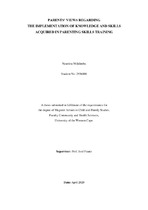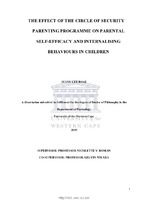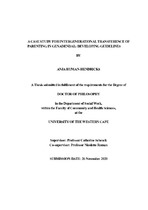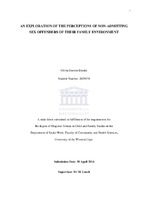Parents’ views regarding the implementation of knowledge and skills acquired in parenting skills training
Abstract
Prevention and early-intervention programmes that promote and assist parents in acquiring
the skills and knowledge required to parent children effectively, with or without behavioural
issues are a crucial to childcare. The Children’s Act, Act 38 of 2005, as well as the South
African Constitution declare that the needs of a child are important; therefore, when the
parents are equipped with adequate knowledge and skills, prevention of a family breakdown
could be achieved. This current research study, therefore, involves an exploration of the
experiences of parents, who had participated in parental intervention strategies, in the form of
positive parenting skills training.
Collections
Related items
Showing items related by title, author, creator and subject.
-
The effect of the circle of security parenting programme on parental self-efficacy and internalising behaviours in children
Rose, Jenny Lee (University of Western Cape, 2019)Early Childhood development is an important phase of development, wherein the trajectory of the child’s life can potentially be determined. However, not all children experience positive outcomes, and many present with ... -
A case study for intergenerational transference of parenting in genadendal: Developing guidelines
Human-Hendricks, Anja (University of the Western Cape, 2014)Parenting practices are known to influence the development of children and family functioning. However, the extent to which these generational influences stretch, and the continuities brought forth between generations has ... -
An exploration of the perceptions of non-admitting sex offenders of their family environment
Davids, Olivia Davene (University of the Western Cape, 2014)This study aims to explore the family environment of non-admitting sex offenders in order to gain insight into the family characteristics that could be contributing factors towards the behaviour of denial. However, the ...




